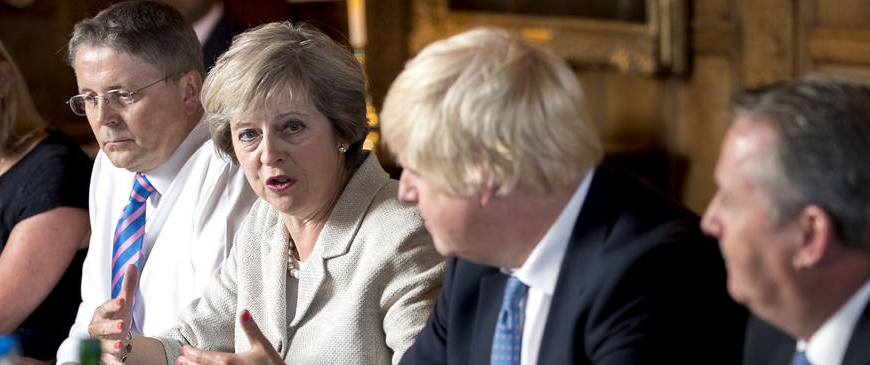
Theresa May's Cabinet customs row is irrelevant, it's the Brexit backstop that really matters
- Westminster politics has recently been dominated by the row within Cabinet over "max fac" vs Theresa May's customs partnership.
- These are the two ideas the UK government has for solving the Irish border issue in Brexit negotiations. Both have been rejected by the European Union.
- However, this discussion is irrelevant until Britain and the EU reach an agreement on the "backstop," trade expert Sam Lowe argues in an article for Business Insider.
- The EU says there will be no deal Brexit deal unless Britain agrees to a fallback option for protecting the frictionless border between Northern Ireland and the Republic.
- May has little choice but to accept the backstop she once decided as unacceptable, Lowe argues.
Theresa May and her Cabinet are currently embroiled in a heated and public debate over potential post-Brexit customs arrangements. Ostensibly this is about finding a solution for the Irish border, in time for the European Council in June.
However, in reality, whatever the outcome, the ongoing squabble over customs amounts to little more than displacement activity.
For the EU and Ireland, British aspirations for the future relationship are not the matter at hand. Instead, they are awaiting substantive British engagement on the detail of the insurance policy, or backstop. Specifically, they want to agree on the means by which physical infrastructure and associated checks on the Irish border are avoided in the event that the future UK-EU partnership fails to do so, or no agreement on the future relationship is reached.
The UK could commit to staying in the single market and customs union and a backstop would still need to be agreed. Aspiration can never double up as insurance.
While the UK agreed to such a backstop last December, other than dismissing a Commission attempt to give the backstop legal form out of hand, it has not yet engaged on the substance. But the can kicking cannot go on forever.
Simon Coveney, the Irish foreign minister, has warned Britain there will be no withdrawal agreement without the Irish backstop, telling the BBC: "We are not reinstating a hope... We are expecting a commitment made by the UK government in December and again in March."
But there is a reason the UK has been avoiding the question. The Commission's proposal, which would see Northern Ireland effectively remain within the EU’s customs union and the single market for goods (alongside provisions for other all-Ireland issues such as electricity), is at the same time both unpalatable and the only proposal to-date that would definitely work. If it came into effect, it would inevitably entail checks on goods arriving from the rest of Britain into Northern Ireland, erecting a border within the UK. It would also obviate the need for physical infrastructure and associated checks at the land border.
May has shot back that "no prime minister could ever agree" to a division between Britain and Northern Ireland. The fact her minority government needs the support of Northern Ireland’s Democratic Unionist Party to have a working majority and pass legislation means she has an even more important reason to dig in. The DUP has said it will not accept a customs border in the Irish Sea.
What other options does she have?
By definition, the backstop insurance position should be agreed before discussion on the future relationship or technology and trade facilitation methods. The only real alternative is for May to convince the EU to apply the backstop to the whole UK, something that would appease the DUP, if not the hard-line Brexiters. However, this is something the EU will not countenance.
While Northern Ireland may be granted special access to European goods and agriculture markets as a result of its unique circumstances, the EU refuses to allow the backstop to become the baseline offer to the whole UK. Many will argue such a stance is not fair, but the EU is the bigger party, with the stronger negotiating hand, and it is how it will be. The sooner the UK comes to terms with this, the sooner it can conclude the withdrawal agreement and focus on the future relationship.
It will certainly be tricky for May to agree the Commission’s backstop proposal. But if she wants to move the Brexit negotiations forward, she will need to at least agree on something substantively similar. Indeed reports on Thursday suggest the government is considering its own 'time-limited' backstop. Whatever the substance of that proposa, this will inevitably involve difficult discussions within her party, and with the DUP.
But ultimately, if May and Brexiters are really so confident that other solutions for the Irish border will be found once the negotiations on the future relationship begin, they shouldn’t fret too much about the precise nature of the insurance policy. After all, we’re never going to need it, right?
Sam Lowe is a research fellow at the Centre for European Reform and a co-founder of the UK Trade Forum.
